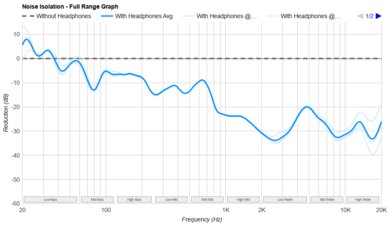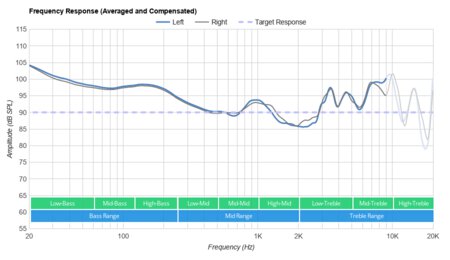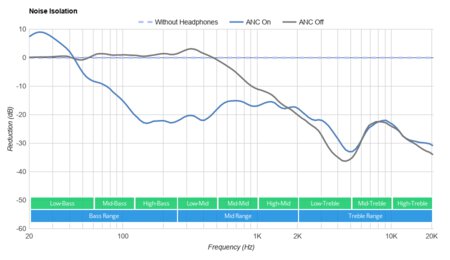
We've currently bought and tested over 25 pairs of Skullcandy headphones. It's a brand with a decent variety of eye-catching models for casual listening, sports, and gaming. The lineup covers a wide range of price points with wired and wireless models that fit in-ear, on-ear, and over-ear. Unique to the brand are a series of bass-heavy headphones with intense haptic bass that wearers can feel. Several models utilize Tile to locate your misplaced headphones through the app, and several offer features like EQ. While the brand isn't renowned for its active noise cancelling (ANC), select models have the capability.
Updates
- 05/30/2024 Skullcandy Crusher Evo Wireless updated
- 12/22/2023 Skullcandy Hesh ANC Wireless updated
- 12/14/2023 Skullcandy Dime 3 True Wireless reviewed
- 09/29/2023 Skullcandy Smokin' Buds/Buds XT True Wireless reviewed
- 07/21/2023 Skullcandy Dime 2 True Wireless updated
-
Best Skullcandy Earbuds
Neutral Sound7.5Commute/Travel7.4Sports/Fitness8.2Office7.0Wireless Gaming5.8Wired Gaming5.7Phone Calls6.2Type In-earEnclosure Closed-BackWireless Truly WirelessTransducer DynamicNoise Cancelling NoMic YesThe Skullcandy Push Active True Wireless are the best Skullcandy earbuds we've tested. These portable, sports-oriented earbuds have an ear hook design that helps keep the buds stable in your ears while you're running. They have a comfortable fit and are rated IP55 for dust and water resistance. Thanks to their bass-heavy sound profile, the extra thump, rumble, and boom added to mixes can help keep you pumped up during your workout. Their companion app has a graphic EQ and presets if you prefer a different sound. You can also access Skull-iQ in the app, a smart feature that allows you to make voice commands. Matched alongside their reasonable price tag, these are the best Skullcandy wireless earbuds.
The buds have a continuous battery life of over nine hours, and their carrying case holds roughly 3.4 additional charges. Unfortunately, they lack active noise cancelling (ANC) and do a mediocre job blocking background noise, like the low rumble of bus and plane engines. You may find this a benefit if you want to stay aware of your surroundings, like when you're on a run on busy city streets. But if ANC is important to you, consider the Skullcandy Sesh ANC True Wireless, which have excellent noise isolation. They lack the Push Active's stability hooks, though, and aren't quite as comfortable.
-
Best Cheap Skullcandy Earbuds
Neutral Sound8.0Commute/Travel7.4Sports/Fitness8.1Office6.9Wireless Gaming5.4Wired Gaming5.2Phone Calls6.4Type In-earEnclosure Closed-BackWireless Truly WirelessTransducer DynamicNoise Cancelling NoMic YesIf you're looking for more affordable buds, the Skullcandy Dime 3 True Wireless are the best cheap Skullcandy earbuds we've tested and a great pair of AirPods alternatives. Made of lightweight plastic with short stems and buttons, these buds are highly portable, although the peekaboo lid exposes the earbuds, which is less protective than a fully encapsulating case. On the other hand, the earbuds are adventure-ready with IPX4 water resistance, and they're cheap enough to keep as a spare set when you don't want to risk your premium headphones. You get three ear tips to hone your fit; they feel reasonably comfortable with good stability. They only passively block noise, so you'll still hear the low-pitched rumble of a bus engine, but the isolation helps to muffle chatty neighbors on your commute.
Unlike the previous-generation Skullcandy Dime 2 True Wireless, these buds scrap app integration, and instead, you get a significantly longer continuous playback battery life, Bluetooth multipoint for two devices, three EQ presets, and a transparency mode. These buds also trade away the strong bass commonly associated with the brand for a relatively neutral sound. If you want a higher IP rating and app support, the Skullcandy Push Active True Wireless have those features.
-
Best Noise Cancelling Skullcandy Headphones
Neutral Sound6.9Commute/Travel7.0Sports/Fitness7.1Office6.7Wireless Gaming5.2Wired Gaming6.9Phone Calls6.5Type Over-earEnclosure Closed-BackWireless YesTransducer DynamicNoise Cancelling YesMic YesThe Skullcandy Hesh ANC Wireless are the best Skullcandy headphones with ANC that we've tested. They have a reasonable noise cancelling performance that can help isolate you from ambient chatter. While they won't cut out lower-frequency sounds, like engine rumble, they can isolate you against higher-frequency sounds, like office chatter and fridge hum. They also boast a battery life of up to 24 hours, which is good for ANC-equipped headphones. However, battery life tends to vary according to usage.
These headphones are comfortable and decently well-built. Their overemphasized bass response brings out boomy kicks and basslines in genres like EDM and hip-hop. Unfortunately, no EQ or sound customization options exist, so you can't personalize the sound profile if the default one isn't to your taste. They also have a decent-quality microphone and the option of using them via their wired analog cable.
-
Best Over-Ear Skullcandy Headphones
Neutral Sound7.5Commute/Travel6.5Sports/Fitness7.0Office6.5Wireless Gaming5.7Wired Gaming7.4Phone Calls6.3Type Over-earEnclosure Closed-BackWireless YesTransducer DynamicNoise Cancelling NoMic YesThe Skullcandy Crusher Evo Wireless are the best Skullcandy headphones we've tested if you're looking for over-ears. These wireless headphones are a versatile pick, and they're especially well-suited to bass lovers thanks to their haptic bass slider, which lets you increase the bass to your liking. On the lowest setting, mixes have more warmth and boom without muddying vocals and lead instruments. At their highest setting, they deliver a very intense thump, rumble, and body, which will please fans of EDM and hip-hop. It's worth noting that their bass and treble delivery can vary depending on fit, seal, and positioning. If you still prefer a different sound, their companion app offers three EQ presets to help you adjust their sound to suit your tastes, alongside a personalized sound feature.
These headphones have over 34 hours of continuous battery life, and you can even use them passively with their 1/8" TRRS cable if you run out of battery life. They're also well-built and decently comfortable, but the ear cups can trap some heat over time. Unfortunately, they have a poor noise isolation performance and struggle to block out the low rumbles of bus and plane engines around you, though this may not matter to you if you plan to use them in quieter environments.
Alternatively, Skullcandy has released other feature-full bassy over-ears, but you may also want ANC as a step up from the base model Crusher Evo. While we haven't tested the Skullcandy Crusher ANC 2, you can expect lots of bass since they're from the same lineup, with the added benefit of ANC to reduce noise around you. These noise cancelling headphones might be the ticket for a select crowd that wants their kick drums loud.
Compared To Other Brands
-
Colorful designs.
Skullcandy offers some of the most colorful headphones on the market. If you like to match your tech accessories to your outfits, they tend to have several color schemes for each model, including two- or three-tone variants and camo/military color schemes.
-
Good headphone variety.
Although we have yet to test Skullcandy's full lineup, they offer many models for different uses. While they don't have any audiophile headphones, the variety is still quite good, especially considering their price range.
-
Plasticky build quality.
Most of Skullcandy's headphones are pretty affordable. However, this may be due to their somewhat plasticky build quality. It's better than some super cheap brands, but the durability between Skullcandy models is inconsistent compared to other affordable options. -
Mediocre sound quality.
They have many models for casual listening, but there's nothing designed with critical listeners in mind. They also tend to focus a lot on delivering a bass-heavy sound, so if you want a more neutral sound, Skullcandy may not be your brand.
Skullcandy vs Anker
Anker and Skullcandy are both well-known in the budget-friendly to mid-price range for their bassy in-ears and over-ears. Anker's product range delivers a wider array of features like multi-device pairing, Hi-Res Audio support, and LDAC. Some of their headphones also have powerful noise cancelling, which rivals higher-end brands, but don't expect the same flashy look or graphic collaborations as Skullcandy. That said, Skullcandy over-ear headphones tend to boast slightly more durable over-ears than Anker, although Anker earbuds often have a better finish.
Skullcandy vs JBL
If you've been looking for affordable headphones, you've probably come across JBL alongside Skullcandy. JBL's lineup offers more diverse options for sports, casual use, and traveling. JBL's lineup is extensive, so if you want more or less bass, you can find a pair to suit your sound profile tastes, as they tend to have more variety for tunings. Most have a companion app with a parametric EQ and presets, so they also tend to offer more robust sound customization features. You may still prefer Skullcandy's (mostly) bass-heavy sound, especially for genres like EDM or hip-hop, and select models have EQ. Skullcandy also has flashier and more colorful headphones, but like JBL, if you prefer black, you can find that too.
Skullcandy vs Beats
Beats and Skullcandy were founded around the same time, and both frequently feature vibrant designs geared towards casual listeners and regulars at the gym. While Beats—like Skullcandy—has been synonymous with bass-heavy sound profiles, in recent years, they have added more balanced frequency responses to select models alongside Apple-centric features like the H1/W1 chip for seamless Apple device switching. Beats' collection is smaller, and each one is usually priced higher than comparable Skullcandy headphones. Most Beats use the 'Find My' function to track headphones, whereas Skullcandy utilizes Tile for the same function. While lower-priced Beats often lack EQ, many budget-friendly wireless Skullcandy models have at least basic preset EQs. However, only Beats manufactures headphones that are compatible with Apple Spatial Audio if you want virtual surround sound.
Overall, Skullcandy delivers a decent variety of fashion-forward headphones that come in many unique colors to match your taste, style, and preferences. They have sports and gaming headphones at an affordable price, too. Unfortunately, they don't have the best build quality. Their sound isn't the most balanced as they favor a bass-heavy audio reproduction, which can polarize listeners. Their Bluetooth models also don't tend to support high-quality codecs but multi-device pairing is available on models at different tiers.
Lineup
Skullcandy has a specific name for each model they release, so it can be unclear how their headphones are categorized. Sometimes, feature-specific variants of that model are available. We consider these variants (and their base model) to constitute a lineup for this brand. This includes the following:
- Crusher = Wireless over-ears with a bass-heavy sound.
- Hesh = Wireless over-ears.
- SLYR = Wireless over-ear gaming headphones with boom mics.
- PLYR = Wired over-ear gaming headphones with boom mics.
- Grind = Truly wireless in-ears with unique features like Skull-iQ Smart Feature support and hands-free voice control.
- Indy = Truly wireless in-ears with a stem design and non-detachable stability fins.
- Push = Truly wireless in-ears with ear hooks.
- Sesh = Truly wireless in-ears. They have a simple design and don't have companion app support.
Within these lineups, headphones come in feature-specific variations or colorways. Brand collaborations that impact design tend to be included in the headphones' name, like the Doritos Dime 2 True Wireless Earbuds. Following the lineup name, feature-related variants are denoted by the following:
- Active = Designed for sports and have better stability.
- ANC = Supports ANC.
- Evo = Base model.
- Fuel = Case supports Qi Wireless charging.
- Transparency = Transparent design.
- Ultra = Discontinued line. Tends to have better battery performance, rapid charging, higher IP rating, app compatibility, and Tile support.
In addition, there are also a handful of standalone models available. There may have been additional variants or previous generations of this model available in the past, but now there's only one model currently available from this manufacturer:
- Dime = Cheap, truly wireless in-ears with a very simple design.
- Ink'd = Wired in-ears.
- Mod = Wireless in-ears with many customization features.
- Riff = Wireless on-ear headphones.
- Spoke = Discontinued cheap truly wireless in-ears. They don't have any extra features.
- Venue = Discontinued wireless noise cancelling over-ears that support multi-device pairing, which is uncommon for this manufacturer.
Recent Updates
-
This article has been updated for clarity with minor text edits.
-
We added the Skullcandy Sesh ANC True Wireless as an alternative to our main pick for anyone looking for earbuds with ANC that are also great for sports.
-
Aug 29, 2024 : We edited the text for clarity in a couple of places but made no changes to our picks.
-
Jun 03, 2024 : A comparison to Beats has been added, and the text in the intro and comparisons has been updated to ensure accuracy.
-
Apr 05, 2024 : This list of recommendations has been checked for accuracy with very minor text edits.
Conclusion
Skullcandy has expanded its style from flashy colors and prominent logos to now include models with subdued colors and subtle logos. There's a large selection of headphones for casual listening, sports, and gaming, but a lack of models catered toward audiophiles. Unfortunately, it's not always the ideal brand for those seeking a more neutral frequency response since most of their headphones favor a bass-heavy sound profile, although select models buck the trend. Their durability seems inconsistent, with some models benefitting from sturdy designs and others feeling plasticky. On the upside, many of their headphones are relatively affordable.
Test Results
Comments
Best Skullcandy Headphones: Main Discussion
What do you think of our picks? Let us know below.
Looking for a personalized buying recommendation from the RTINGS.com experts? Insiders have direct access to buying advice on our insider forum.
Update: This article has been updated for clarity with minor text edits.
What do you think of these changes? Let us know
- 21010
Do not buy the headphone, All have Bluetooth issue































































































